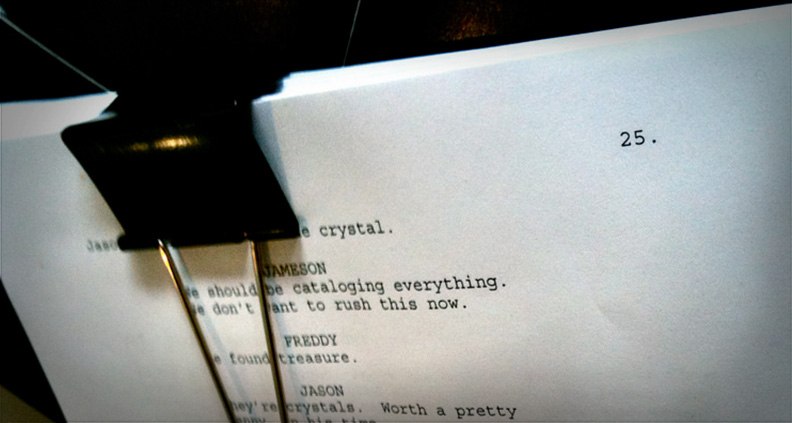This Is How We Do It: Knowing When to Quit
Each month in This Is How We Do It writer Cortney Matz explores issues of productivity, coming away with (more or less) helpful thoughts on finishing that pesky screenplay, short film or whatever else may be vexing the artistic mind. Warning: this is not an advice column.
KNOWING WHEN TO QUIT
So we’ve talked about saying No. We’ve talked about bouncing back from disappointment. But what do you do when you’ve bounced back, and bounced back again and even bounced back two more times—and things still don’t seem to be working out the way you’d hoped. Then what? When do you hit your bounce-back limit?
Sure, perseverance in any creative field is key. But is there ever a time to finally quit, or take a step back, for good? Yes, kind of. But not always in the way you’d think.
100 DRAFTS AND FIVE YEARS LATER…

If you’re hitting wall after wall with no breakthrough, something does need to change. But that’s not to say you should quit your project for good. You could quit something else instead. Like your job.
Consider intrepid screenwriter Michael Arndt (Star Wars: The Force Awakens, Toy Story 3). After working in development for 10 years—all the while writing scripts and submitting to the prestigious Nicholl Fellowship, without ever getting any further than the semifinals—he finally saved enough cash to fund a year of unemployment in order to focus on writing his breakthrough screenplay.
Having never sold a script before, he came up with seven stories—six of which failed to land with his collection of trusted readers. But the seventh one did. During that single year of intense focus and 100 drafts later, Arndt ended up with a script called Little Miss Sunshine—and Nicholl still didn’t go for it.
“Dammit, if I’m going to do something, do it right. I had read enough mediocre scripts and was determined not to inflict another one on the world.” –Michael Arndt
Even as Sunshine sped off to its happy ending (eventually winning Best Screenplay at the 2006 Film Independent Spirit Awards and an Oscar for Best Original Screenplay) the five years between selling the script and going into production saw more than a few obstacles. Arndt himself was fired off the project after three years of wrestling with Focus Features over creative issues (don’t worry, he was rehired a month later).
What does this teach us? How do we learn from Arndt’s example of perseverance while the powers that be did not extend much encouragement?
QUITTING

No two success stories are alike, and certainly Arndt’s experience is atypical. But I highlight it here to try and adjust two preconceptions I find in many aspiring filmmakers: the first has to do with who’s in charge of your career, and the second is the role of taking a calculated risk in order to make the leap to greatness.
So! Here are some thoughts on knowing when to quit:
Quit forcing a square-peg-round-hole situation. If you’ve beaten your head against the same old wall, try a new wall. Nicholl’s stated mission is to “identify and encourage talented new screenwriters.” If they haven’t identified and encouraged you, does that mean that you’re not talented? Of course not. Remember: even after 100 drafts, Arndt didn’t make it into that coveted category—and not because he’s untalented or because Nicholl is run by jerks. More likely it was a simple mismatch between what Nicholl was looking for and what Arndt provided. Instead of abandoning hope, Arndt simply went a different direction.
Takeaway 1: Rather than basing all your hope on one pass/fail method, try branching out.
Who do you know that’s in your corner where you are, right now? What do they need? What are some steps you can take toward helping each other? This principle applies to writers as well as actors, producers, editors, sound engineers, makeup artists… really, the entire gamut of filmmaking.
Quit hoping for a miracle. Maybe you don’t have the savings required to quit your day job to pump out 100 drafts of your award-winning script in order to take the next big step in your career. But it might very well take something equally bold. If you find that your aspirations involve vague wishes for more time, luck or lottery winnings, it might be time to come up with a better plan.
Takeaway 2: Rather than hoping for the best, put your plan to work and trust that process.
“To achieve great things, two things are needed: a plan and not quite enough time.” –Leonard Bernstein
The reality is, you can do this. You just have to figure out how. Advice from mentors, friends in the business and the people you meet at Film Independent events can help hone your sense of direction, but come up with an honest, step-by-step plan. Then pitch it to some trusted advisors. Take their feedback seriously. Try to find answers to your questions. There are many paths to your next project, but you do have to pick one and follow it.
NOW, HAVING SAID ALL THAT…

There is value in taking a break when you truly are overworked (and guess what, we have a post on creative burnout too!)—if the thought of quitting your film actually inspires hope in your heart, do it. There is no shame in stepping back to breathe, get perspective, and enjoy your life.
Your inspiration, creativity, and passion for your project will catch up with you. I promise.
To learn more about Film Independent, subscribe to our YouTube channel or follow us on Twitter and Facebook. To learn how to become a Member of Film Independent, just click here.
